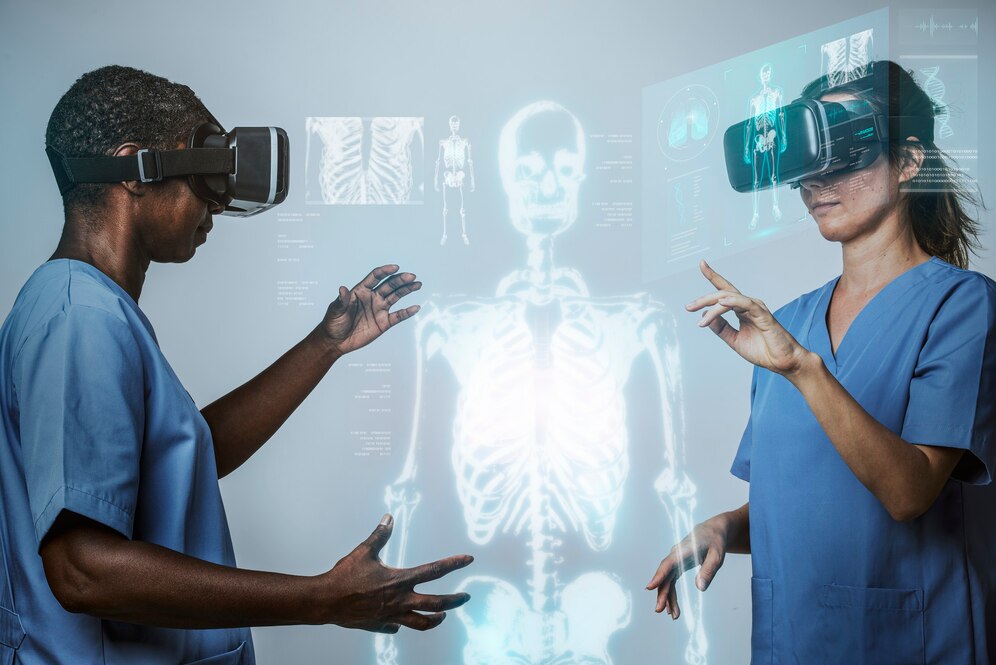Artificial Intelligence (AI) has revolutionized various industries, and healthcare is no exception. One of the most significant advancements in healthcare technology is the integration of AI into medical imaging processes. This article explores the benefits and use cases of AI-powered medical imaging, shedding light on its transformative potential in diagnosing and treating diseases.
Introduction to AI-Powered Medical Imaging
AI-powered medical imaging refers to the use of artificial intelligence techniques, such as machine learning and deep learning algorithms, to analyze medical images with a high level of accuracy and efficiency. Traditional medical imaging techniques, such as X-rays, MRIs, and CT scans, generate vast amounts of data that can be challenging for human radiologists to interpret accurately. AI algorithms can process this data rapidly and provide insights that aid in diagnosis and treatment decisions.
Understanding AI in Medical Imaging
What is AI?
Artificial Intelligence (AI) involves the development of computer systems capable of performing tasks that typically require human intelligence. In the context of medical imaging, AI algorithms can analyze medical images, identify patterns, and make predictions based on the data they process.
Application of AI in Medical Imaging
AI algorithms are utilized in various aspects of medical imaging, including image interpretation, image reconstruction, and image enhancement. These algorithms can learn from large datasets of medical images to improve their accuracy and performance over time.
Benefits of AI in Medical Imaging
Increased Accuracy and Efficiency
AI-powered medical imaging systems can analyze medical images with a level of accuracy that rivals or surpasses human radiologists. By automating the image interpretation process, AI reduces the likelihood of human errors and improves diagnostic accuracy. Additionally, AI algorithms can analyze images much faster than humans, leading to quicker diagnosis and treatment decisions.
Early Detection of Diseases
Early detection of diseases is crucial for improving patient outcomes and reducing healthcare costs. AI algorithms can detect subtle abnormalities in medical images that may be overlooked by human radiologists, enabling the early diagnosis of conditions such as cancer, cardiovascular diseases, and neurological disorders.
Personalized Treatment Plans
AI algorithms can analyze medical images and other patient data to generate personalized treatment plans tailored to each individual's unique healthcare needs. By considering factors such as disease severity, patient demographics, and treatment response, AI-powered systems can optimize treatment outcomes and improve patient care.
Use Cases of AI-Powered Medical Imaging
Cancer Detection and Diagnosis
AI algorithms are widely used in cancer detection and diagnosis, particularly in interpreting mammograms and other imaging studies. These algorithms can identify suspicious lesions, classify tumors, and predict the likelihood of malignancy with a high degree of accuracy.
Neurological Disorders Diagnosis
In the field of neuroimaging, AI algorithms are employed to analyze brain scans and detect abnormalities associated with neurological disorders such as Alzheimer's disease, Parkinson's disease, and multiple sclerosis. Early detection of these disorders can facilitate timely intervention and management.
Cardiac Imaging
AI-powered cardiac imaging systems can analyze echocardiograms, cardiac MRIs, and CT scans to assess cardiac function, detect structural abnormalities, and predict cardiovascular events. These systems play a vital role in the diagnosis and management of heart disease.
Orthopedic Imaging
AI algorithms are utilized in orthopedic imaging to assess musculoskeletal conditions such as fractures, arthritis, and sports injuries. These algorithms can accurately identify bone and joint abnormalities, aiding orthopedic surgeons in treatment planning and surgical decision-making.
Emergency Medicine
In emergency medicine, timely diagnosis is critical for patients with life-threatening conditions such as traumatic injuries and acute strokes. AI-powered medical imaging systems can expedite the diagnosis process by rapidly analyzing imaging studies and alerting healthcare providers to critical findings.
Challenges and Limitations
Despite the numerous benefits of AI-powered medical imaging, several challenges and limitations need to be addressed:
Data Privacy and Security Concerns
AI algorithms rely on large datasets of medical images for training and validation. Ensuring the privacy and security of patient data is essential to prevent unauthorized access and protect patient confidentiality.
Integration with Existing Systems
Integrating AI-powered medical imaging systems with existing healthcare IT infrastructure can be complex and time-consuming. Compatibility issues, interoperability standards, and workflow integration need to be carefully addressed to maximize the benefits of AI technology.
Regulatory and Ethical Issues
Regulatory agencies such as the FDA play a crucial role in overseeing the development and deployment of AI-powered medical devices. Ethical considerations, such as bias in algorithmic decision-making and patient consent for AI-driven diagnostics, also need to be carefully addressed.
Future Outlook
Despite the challenges, the future outlook for AI-powered medical imaging is promising. Ongoing advancements in AI technology, including deep learning algorithms and computer vision techniques, are expected to further enhance the accuracy and performance of medical imaging systems. As AI continues to evolve, its potential to transform healthcare delivery and improve patient outcomes will become increasingly apparent.
Conclusion
AI-powered medical imaging holds immense promise for revolutionizing healthcare delivery by improving diagnostic accuracy, enhancing patient care, and enabling personalized treatment approaches. By harnessing the power of artificial intelligence, healthcare providers can leverage medical imaging data to make more informed decisions and ultimately improve patient outcomes.
FAQs
Q. How accurate are AI algorithms in medical imaging?
AI algorithms can achieve high levels of accuracy in medical imaging, often comparable to or exceeding human performance.
Q. Are there any privacy concerns associated with AI-powered medical imaging?
Yes, ensuring the privacy and security of patient data is a significant concern in AI-powered medical imaging. Strict measures need to be implemented to safeguard patient confidentiality.
Q. What are some common use cases of AI in medical imaging?
Common use cases of AI in medical imaging include cancer detection, neurological disorders diagnosis, cardiac imaging, orthopedic imaging, and emergency medicine.





Comments